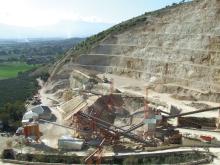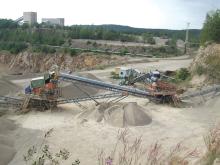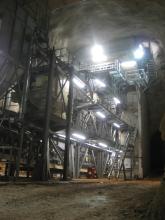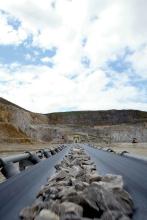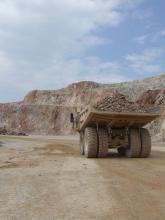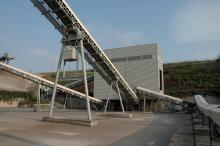
After 40 years of operation, Ibiza's third largest quarry - Cantera Can Orvay - is investing to step up production. Claire Symes reports
The island of Ibiza has become synonymous with summer holidays and partying the night away in one of its many world-famous clubs. But demand for hotels, apartments and infrastructure needed by the tourism industry also means that the island has a vibrant aggregates market.
For the last 40 years the Cantera Can Orvay quarry has been supplying limestone aggregates for the local concrete and asphalt market. Today the quarry is gearing up for the next 40 years with a €800,000 investment in new crushing equipment and expansion plans are also underway.
The quarry is the third largest in Ibiza with a daily output of 3000tonnes per day making it the largest family-owned operation on the island. The quarry is run and operated by Juan Cardona but it was his father that decided to move into the quarry business in the 1960s and started work at Cantera Can Orvay. While Cardona's father is no longer involved in the business, his presence is still clear in the form of a photograph taken in the quarry sat close to Cardona's desk.
Located just outside of Ibiza's main town Eivissa, the quarry sits high on a hillside overlooking Ibiza's famous Ses Salines salt pans which supply salt to kitchens around the world.
The quarry supplies its high quality limestone to four of the island's six ready mixed concrete plants as well as Ibiza's only asphalt plant. In essence, material from the quarry is in demand and Cardona is investing to increase efficiency and boost production at the site. In the bottom of the quarry a crane is busy carrying out the preliminary work for a new crushing plant which is due to be commissioned later this summer.
Production at the quarry has changed significantly since the site opened in 1968 when the daily output was nearer 300tonnes. When Cardona's father opened the site, most of the equipment was second-hand. "We had a haulage business at the time and when the trucks were no longer reliable for use on the road, they were moved to the quarry," said Cardona. "More time was spent repairing the equipment than actually using it." The only two new items of equipment that Cardona's father had were two
It was this reliability that has led to the quarry's investment in other loading and hauling equipment from Cat - nine machines in the last three years in total. The quarry has recently moved from using rigid dump trucks to articulated ones to improve safety on the site's 60% gradient haulage roads.
In fact the new Cat ADTs are the first on the island of Ibiza and Cardona is pleased with the performance so far.
"The brake retarders on the new ADTs make them much safer compared to the rigid machines that used to skid on the steep haul roads," said Cardona. "Although making the haul roads shallower would have allowed the rigid machines to carry on operating, it is more cost effective at Cantera Can Orvay to have fewer but larger benches and steep haul roads." The older
"While the cost of new machines is high, I need to have the best equipment available to ensure I can maintain my production level but also to keep the operators happy. Productivity definitely outweighs the cost issue. But finding skilled operators is a real challenge in Ibiza so I have to have comfortable machines in order to attract and retain the best ones," said Cardona.
When it comes to operator comfort, Cardona is speaking from experience - he started working at Cantera Can Orvay 27 years ago and frequently worked long hours in machines with no cabs in the full glare of the sun and with no protection from the dust. "Quarrying in those days was a hard and difficult job," he said. "The features on newer machines have made quarrying an easier profession. Also how can I ask my operators to work long shifts and maintain high levels of productivity and safety if they are not comfortable?"
Production
Cardona's 20-strong workforce at Cantera Can Orvay carry out blasting up to five times a day despite the strict controls that Cardona said the local authorities impose on the site. "We work the limestone in 20m high benches," he said. "We use our own
"We are limited to using 800kg of dynamite in each blast but it is left to us to determine how many holes we charge for each blast. We usually start work preparing the first blast at 8am and regulations mean that we have to complete the work by nightfall but generally it is finished by 2pm." The quarry operates five and a half days a week with an eight hour shift on a full day.
After blasting, the rock is loaded by excavator into the fleet of ADTs, which take the material down towards the pit of the quarry where the crushing and screening plant is located. The rock is discharged straight into the quarry's primary jaw crusher - made by Spanish manufacturer TZB, which in turn feeds two mobile TZB impact crushers via conveyor belts. The quarry also has a TZB tertiary unit for manufacturing sand. Screening is carried out using mobile equipment - a hired
According to Cardona, the set-up gives the quarry a total production capacity of 3500tonnes per day but commissioning of the new TZB primary crusher will double production in the near future. The extra capacity is also likely to lead to further investment in new equipment but Cardona has said that he will wait until the new crusher is in place before making any decisions on further machine purchases.
Markets
The concrete sector is Cantera Can Orvay's main market with around 50% of its production going into the local ready mixed concrete plants and just over 16% to local precast concrete operations. The rest of the material is used by the road construction sector - with an equal split between asphalt production and sub-base materials.
Material from the quarry is supplied all over the island of Ibiza and to the neighbouring island of Formentera too. The quarry does not operate its own transport fleet. Instead customers send their own trucks, varying in size from 2 to 40tonnes, to collect the aggregates they need.
The quality of the limestone means that while demand is dropping, as it is currently right across Spain, sales from Cantera Can Orvay are still strong. It also fetches a good price in the market at around €7 per tonne. "We have had to raise prices recently to help cover the rising cost of production caused by fuel price increases," said Cardona.
Cardona refused to be drawn on how the proportion of overall production costs now spent on fuel have changed, but he did say that expansion of the equipment fleet has had a big impact on costs. "We used to use 7000litres of fuel over two days but now it is double that and it has had a huge impact on production costs but it has improved productivity, which is why I am investing in the new crushing equipment to further improve efficiency," he said.
Maintenance
With Cardona's focus on productivity, planning maintenance for the machines to prevent breakdown and to maintain production is essential. "We are lucky that the limestone at Cantera Can Orvay is very soft and less abrasive than other limestone deposits so we do not have the same issues with wear and tear that other quarries have," he said.
Cardona has one in-house mechanic to deal with day to day issues but he has service contracts on all of his machines from Cat for peace of mind. Some of the machines at Cantera Can Orvay operate 14hours a day during peak periods, clocking up around 2500hours per year. "The Cat machines are very durable but in these kind of conditions their reliability relies on regular servicing," he said. "Technology like the auto-dig function on the wheeled loaders is great for less experienced operators but maintaining these hi-tech machines in-house would be difficult." According to Cardona, Cat's local dealer provides him with a good level of service but there is still room for improvement. "Offering after sales service is always a challenge on an island like Ibiza," he said. "But Cat has a stronger presence than other manufacturers because is has around a 50% share of the local construction equipment market."
Environment
According to Cardona, the environmental regulations affecting operation of a quarry in Ibiza are growing ever tighter and more difficult to comply with. The quarry is not close to any large residential developments but there are a number of houses on the road leading from the main road to the quarry site itself, so Cantera Can Orvay does have to operate under guidelines to prevent upsetting the local community.
"Dust is a problem for Cantera Can Orvay," said Cardona. "We use a water spray right across the site twice a day to minimise the amount of dust in the air and we are also covering the crushers and conveyors. As well as reducing dust, this also helps to minimise the noise generated by the crushing operations." Other regulations that Cardona has seen tighten over the years has been those governing health and safety. "We have been fortunate to never have had a serious accident at Cantera Can Orvay in the quarry's 40 year history," he said. "We have been fortunate but we take training seriously as we would like to retain this good record. We use a local specialist sub-contractor to meet our health and safety training needs and they organise formal sessions for the team every three months to ensure we are all up to date on the latest information and following existing legislation."
Expansion
The land that Cardona is working at Cantera Can Orvay is rented but he is looking to gain consent to expand the quarry. He said, "There are more reserves here than I will ever see extracted during my lifetime, but it is almost impossible to open a new quarry in Ibiza, so expanding Cantera Can Orvay is important for the local market. It is much simpler to gain consent to expand an existing site.
"I have other land in Ibiza where I have tried to gain consent to open other quarries but these have all been refused, so I am focusing on Cantera Can Orvay. I will either buy the extra land myself or the current land owner will do it and rent the land to me." While efforts to expand the extraction area may take several years to complete it is likely to coincide with the start of restoration of the worked out sections of the quarry. "Once the quarry has reached its maximum height, we will start to reprofile the benches and replant them with trees to soften the look of the quarry," said Cardona.
Next generation
Talk of expansion and restoration plans for Cantera Can Orvay brings the subject of continuing ownership of the site by the Cardona family.
Cardona himself started work in the quarry when he was 20 years old. "My father gave me the option to study or to work," he said. "At 20 I had had enough of studying so I chose to work and started out as a machine operator in the quarry." It was a role that he was familiar with after having grown up in and around the quarry, but what of the next Cardona generation? "I have a daughter but I don't want to push her into the business," he said. "Quarrying used to be a tough business but with development of modern, efficient machines, a well run quarry is now a good business to work in."

